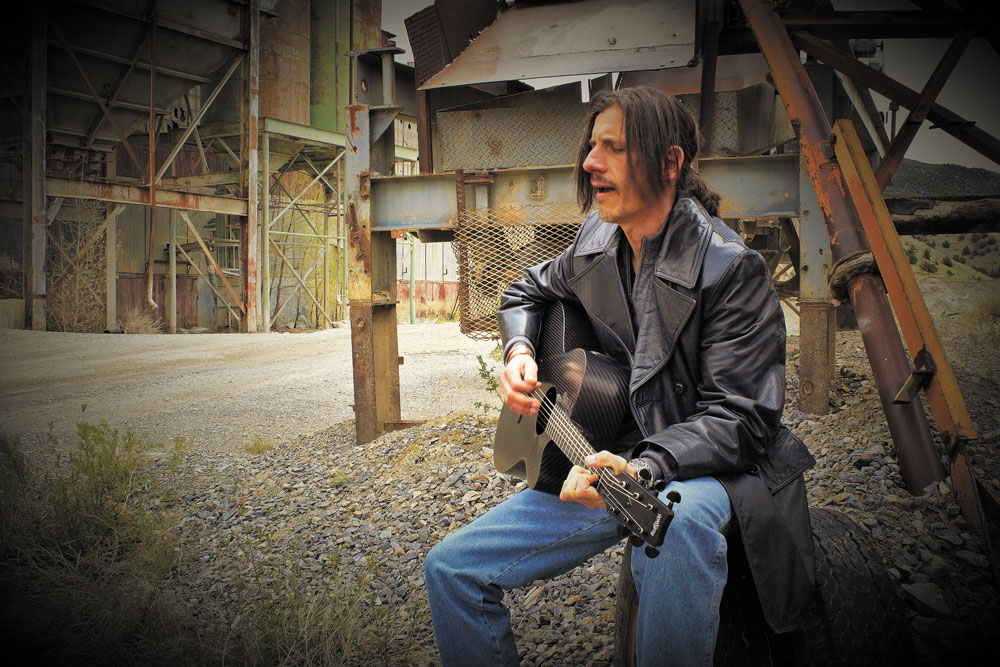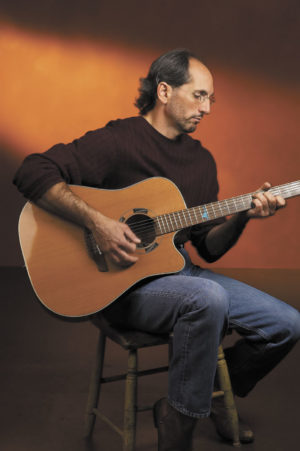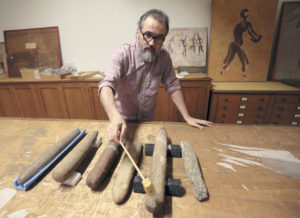
By Joe Stone
At first glance, Mark Rostenko may seem like one of the least likely people to win a nationwide songwriting contest. While he’s been involved with music for a long time and has been playing for fun with a local jam group for a number of years, he only started taking his music seriously thee to four years ago. Even then, it took encouragement from a friend before he “got more serious” and began creating his own songs. Now, a little over a year later, American Songwriter has awarded the Cotopaxi, Colorado, resident grand prize in the magazine’s 2016 Lyric Contest for his song “Billy (Off the Line).” First glances can be deceiving, and for this writer, it only took one conversation and a listen to Rostenko’s lone demo to realize he’s the real deal. He is a man fulfilling his destiny to write and perform music that can make a difference, music that can change people’s lives.The obvious comparison is to Mel Tillis, the stuttering country-and-western vocalist whose singing earned him a place in the Country Music Hall of Fame, but the comparison ends with musical talent, as Rostenko probably couldn’t be more different from the goofy persona Tillis invoked in order to further his entertainment career alongside the likes of former NFL quarterback Terry Bradshaw. Thoughtful, intelligent, funny and authentic, Rostenko embodies the transformative power of what Joseph Campbell dubbed “The Hero’s Journey.”
Rostenko vanquished the “Black Knight” that blocked his path for decades, and he returned from the “perilous adventure” with, in Campbell’s words, “the power to bestow boons on his fellow man.” Of course, the hero’s journey symbolizes the internal human journey of self-discovery that we all must undertake to truly become the best version of ourselves, and the adventure is the internal exploration of the “undiscovered country” of the human psyche. In Rostenko’s case, the boon is his hard-earned ability to transmute lifelong challenges into songs that communicate and uplift on the elemental level of heart and soul.
Rostenko’s story reaches back to his childhood (don’t all our stories?) when he dreamed of being a musician but his father refused to offer any support. At the age of 14, Rostenko snuck out of his house to buy his first guitar without parental approval. “I learned to play off the radio. I had no lessons.” But it took decades for him to reach a place in life where he could summon the courage to set out on the journey to fulfill his lifelong dream.
[InContentAdTwo] “I went down a really dark road because of my speech. I was obsessed about my speech, and it cost me over 30 years of my life.” Much of that time involved working with speech therapists, but none of them was able to help Rostenko overcome his stutter. Still, he worked successfully as a commodity trader, then as a metal artist, and he self-published a book he wrote in 2000. But his obsession with his speech kept him socially isolated, and Rostenko finally moved to a remote cabin near Cotopaxi “to disappear.”
While living alone, Rostenko “started to sort it out,” and a big part of sorting it out involved a return to music, his lifelong dream. “It came to a point where I said, ‘I’m gonna make it happen and just deal with it.’ I’m so passionate about music that I finally found a way out. I’ve never spoken this freely in my entire life. … It was like being in a wheelchair then realizing you can walk. I came to realize that we stop ourselves.”
Ironically, dropping out and living in solitude ultimately brought Rostenko back into the human community as he developed his talent, began making music with other musicians and then wrote songs that people found meaningful. By embarking on his own hero’s journey and confronting significant obstacles, Rostenko came to understand, “What’s possible for people is so much more than we realize. … I want to inspire others to change themselves. I want to spread that in my songs. … I think we can change the world with songs.
“When I really stepped onto this path, things really started to work. Fear of things like not paying bills keeps us from doing the things we should do. If you follow the thing you’re really about, it’s been my experience that things fall into place. My speech is a good example. … It’s taught me that people really want to be themselves. Once you find out who you really are, things fall into place.”
In the relatively short time that Rostenko stepped onto his path, things certainly have fallen into place. He entered the American Songwriter lyric contest “on a whim,” setting up a new email address that he frequently forgot to check. At one point, he’d gone more than a week without checking it, and when he did, his inbox was full of messages from American Songwriter informing him that he’d won the contest and imploring him to respond. “I almost missed out because I didn’t check my email,” he laughed.
Rostenko’s winning song, “kinda came out outta nowhere. I had the music down for awhile.” The lyrics came later. Based on his own childhood struggles and his experiences with a childhood friend, Rostenko said he only realized what the lyrics were about well after putting pen to paper. The friend had moved away but eventually returned, “pretty troubled ….”
While songs like “Billy (Off the Line),” can evoke a sort of sadness, that melancholy element is linked to Rostenko’s desire to share the lessons he’s learned (the hard way), but Rostenko “always want(s) to leave the listener with hope.” Speaking of which, the benefits of winning the American Songwriter contest offer hope that Rostenko’s talent will be discovered by a wider audience and allow him to continue on his journey of touching people’s lives with his “boon” of inspired music.
His grand prize includes an all-expense-paid trip to Nashville in early 2017, where Rostenko gets a demo recording session at Omni Sound Studios. Even better, he will be treated to a “dream co-write” with acclaimed singer-songwriter Mary Gauthier. A brief scan of her bio offers another dose of hope – that these kindred-spirit lyricists will produce amazing music together, music that makes the world a better place to live.
Joe Stone is a writer who hopes he’s written at least one thing worth plagiarizing. This article originally appeared in the December 2016 issue of Ark Magazine.





